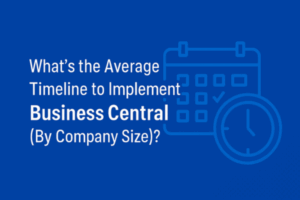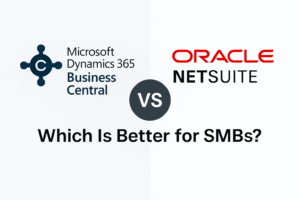Understanding ERP Systems for the EMS Industry
Are you thinking about investing in ERP software for electronics manufacturing? Then, you should try to visualize just how expansive this industry is! Tracing its origins back to the ‘60s in Alabama, the niche of EMS has developed globally nowadays. We have original equipment manufacturers (OEMs) ordering lots of electronics from different countries.
This industry is often divided into different tiers, ranging from $100 million to $5 billion based on overall revenue. The job of a company in the electronic manufacturing sector is to:
- Design and assemble PCBs
- Package the end product
- Create prototypes
- Conduct tests
The term “PCB” here refers to a printed circuit/wiring board that hosts electronic components so they’re wired together and assembled interconnectedly. Hence, using the best ERP software for the electronics manufacturing industry will help you do all these things efficiently.
What is an ERP System? A Brief Overview
Let’s talk about the general idea behind ERPs for a bit, shall we? We’ve already discussed the concept of ERPs generally in the article on construction software. In simple words, an ERP integrates and manages a range of aspects of your EMS business. It’s akin to a centralized database that lets different departments share information and break down communication silos. It automates key business processes by offering real-time visibility and control over critical operations.
7 Core Components of a Modern ERP System
We’ll discuss the key features of electronic manufacturing software in detail later; there’s a section dedicated to it! Here, we’ll briefly go over the main components of general ERPs. This is what you’ll find in an ERP solution not designed necessarily for the EMS industry:
- Accounting & Finance: You can do your budgeting and financing reporting with an ERP. It’ll take care of your accounts payable and receivable as well.
- Human Resources: Want an easy way to handle employee data and process their payment? Use an ERP solution for employee training, recruitment, and performance management.
- Supply Chain Management: This software makes it easier to manage the flow of goods, services, and others in your company. You can manage your inventory like a pro!
- Manufacturing: No more product planning/scheduling will be a problem for you! You can easily control the quality of your electronics with the right ERP solution.
- Sales & Marketing: Even in this regard, ideal ERP software for electronics manufacturing shall come to your rescue by making sales order processing and running marketing campaigns just as easy as eating pie!
- Customer Service: Similarly, you can track customer inquiries and address their concerns with a robust ERP solution. Customer satisfaction is guaranteed with EMS ERP!
- Business Intelligence: Lastly, you can use ERP software to gather real-time insights into how the EMS business is doing. The ERP will monitor KPIs and help you in data-driven decision-making or DDDM.
Benefits of an ERP for Electronics Manufacturing
Hopefully, you can now see why ERP software is vital for a company that makes electronics. However, it seems appropriate to conclude this section by mentioning the key benefits of ERPs in general. How can a product like that help your company grow and become more profitable?
- You can automate critical business operations and get rid of manual errors.
- A centralized database makes collaboration among employees easily feasible.
- The data is also centralized, so you don’t get those annoying communication silos.
- It gives you a holistic view of business operations for better performance management.
- This software keeps up with your organization’s growth spurt and offers immense scalability.
In the next section, we’ll deliver what was promised, i.e., the key parts of electronics manufacturing ERP. You’ll learn why an EMS company should invest in enterprise resource planning.
6 Key Features of ERP Software for Electronics Manufacturing
We hope that you’re now ready to invest in an ERP for electronics manufacturing. After all, this industry has been growing rapidly since the weakening of the coronavirus pandemic. In 2023, the EMS niche exceeded a whopping $500 billion. Growing at a CAGR of almost 5%, this industry will exceed $700 billion by 2030. Electronic manufacturing business owners must invest in the right ERP tool. An ideal EMS ERP will offer you these essential features:
1. Inventory Management
Let’s start with a feature many electronics manufacturers find quite important, i.e., tracking, managing, and restocking inventory. In a typical EMS firm, all components, raw materials, finished goods, and other items require proper tracking & optimization. So, an ERP will give you features like:
- Real-Time Tracking: You can avoid running out of stock or accidentally overstocking by using an ERP system that provides real-time visibility into your inventory levels, locations, & movements.
- Demand Forecasting: ERP systems utilize advanced forecasting algorithms so you can anticipate which electronics item will be in demand. That’s how you can keep sought-after products in bulk in your warehouses.
- Inventory Serialization: How about you track individual components of your products with unique serial numbers? That’s how you can ensure the traceability of these products and recall a defective item easily.
- Vendor Management: ERP systems are a great way to streamline vendor management for your electronics manufacturing company. That’s how you can maintain effective relationships with an important vendor and ensure timely deliveries of diodes.
2. Supply Chain Management
When it comes to running an electronics manufacturing business, you need to manage your supply chain like a pro! That’s how you can meet customer demands and maintain a competitive edge in the industry. That’s why the best ERP software for electronics manufacturing offers you the following features so you can keep your supply chain up and running:
- Purchase Order Management: Using an ERP for electronics manufacturing helps you automate & streamline the process of purchase orders. From order requisition to final approval, you’ll do it all with an ERP tool.
- Supplier Collaboration: Using an ERP system will help you facilitate collaboration with suppliers. That’s how you can exchange documents and share forecasts – making communication easier.
- Warehouse Management: With robust inventory management and supply chain management, you can easily optimize business operations. An ERP solution makes it way easier to pick, pick, & ship processes error-free.
- Shipping & Logistics: You can integrate your ERP system with shipping carriers as well. It’ll give you real-time tracking information regarding product shipments.
3. Production Scheduling
Next, we come upon efficient product scheduling! No electronics manufacturing software ERP must lack this essential component. It can potentially reduce lead times and make resource utilization much better for EMS businesses. You can streamline production scheduling with an ERP tool that offers this feature. It will perform these actions:
- Capacity Planning: What is your electronics manufacturer plant’s capacity to produce stuff? You can use an ERP solution to assess the availability of resources (labor and materials) for capacity optimization.
- Work Order Management: You can also use your EMS ERP to generate and manage work orders easily. It’s a great way to assign tasks, track progress, and coordinate between various stages of production.
- Production Monitoring: You can also use your ERP system to get real-time visibility into the whole production process. Electronics manufacturers are increasingly investing in ERPs to monitor the team’s performance and track bottlenecks easily.
- Production Reporting: Moreover, ERPs are a great way to generate comprehensive production reports. They let you see valuable insights and quality metrics for continuous improvement.
4. Product Lifecycle Management
When it comes to buying the best ERP software for the electronics manufacturing industry, you mustn’t forget about this essential feature, i.e., product lifecycle management (taking care of your product from inception to disposal). Did you know that Americans dump 300 to 400 million electronic items in trash sites every year? This leads to e-waste, and the best electronic manufacturing companies in the 2020s will be ones that can recycle their products responsibly. So, an EMS ERP will offer you amazing features to help you achieve this goal.
- Engineering Change Management: Change management protocols set by an ERP will make sure that engineering teams work well with procurement and production teams. This collaboration is very important in product lifecycle management.
- Document Control: After change management, we come upon document control. ERP systems will create a centralized repository to keep all docs related to product specs, drawings, revisions, etc., for easy access.
- Regulatory Compliance: Also, an ERP for electronics manufacturing will make sure that you are adhering to all strict & unavoidable industry standards and regulations. This software provides a great amount of traceability when it comes to document control and audit trail.
- Product Data Management: Lastly, an ERP will centralize product data as well. You’ll have access to a range of product-related datasets, such as BOMs and specifications. That’s how you can ensure data integrity and support accurate planning & costing.
5. Quality Control
You should also invest only in electronic manufacturing software that offers robust quality control or QA features. Many OEMs around the world produce defective items that lead to e-waste. An ERP tool can reduce this waste by producing high-quality products only. So, you should choose an ERP that offers you these fantastic features:
- Quality Assurance: ERP systems allow electronics manufacturers to enforce rigorous standards of quality. You can use this software to track quality metrics and implement penalties in case the workforce falls short of these standards.
- Inspection Management: Moreover, you can quickly manage inspections with an ERP tool. It will help you generate non-conformance reports and facilitate root-cause analyses.
- Supplier Quality Management: ERP systems make it easier to monitor supplier quality as well. A robust ERP solution will give you supplier scorecards so you can stay on top of QA.
- Product Testing & Certifications: You can manage product tests and certifications with an ERP as well. It lets you adhere to compliance requirements set by the global EMS community.
6. Financial Management
Lastly, the best cloud ERP system for electronics manufacturing will offer financial management, a very important feature for such systems to have. Here’s how an ERP tool will help you do financial tracking:
- General Ledger: For starters, ERP for electronics manufacturing will create general ledgers. You can track financial transactions with this ledger while keeping an eye on your budget.
- Accounts Payable & Receivable: Also, ERPs can automate and streamline accounts payable and receivable processes for you. You can stay on top of pending payments and make collections.
- Costing and Pricing: Next, you can do accurate product costing with an ERP tool. It included the costing process for labor, materials, overhead expenses, etc.
- Financial Reporting: For comprehensive financial reporting, you can rely on an ERP solution. So, this software will take care of your income and cash flow statements.
Choosing the Right ERP System for Your Electronic Manufacturing Company
Let’s cut to the chase: How do you choose the perfect ERP for electronics manufacturing? It’s a critical decision that can impact your business operations in the long run. We’ll explore some key guidelines and factors to keep in mind when you’re shopping for a suitable ERP tool:
Define Your Business Needs
The first step is to clearly understand your business needs. What does your business need to become successful? Which goals and challenges are you struggling to meet? That’s how you can choose the right ERP solution for your business. Identify the key functionalities and major features that your company needs right now. For instance, you may require improvement in these areas:
- Inventory management
- Supply chain integration
- Financial management
- Product Scheduling
- Quality control
In short, always define your business needs before determining which ERP systems should be chosen. Your job is to choose an ERP tool that aligns with your specific requirements.
Compare Different Options
The second step is to always compare different ERP systems designed for electronic manufacturing. Let’s say you’re given three options to choose from, so you’re evaluating them based on the following:
- Compare the functionalities of each ERP system to see how they align with your business needs. Do they have the right functions to help your EMS business grow?
- How scalable are these features? Only invest in a software solution that’ll accommodate the rise & growth of your electronic manufacturing business based on increased data volumes and more users.
- Thirdly, you should see how well these software programs integrate with existing software. Are they working well with other tech tools, such as CAD/CAM, PLM, MES systems, etc.?
- Never disregard user-friendliness! See which ERP option offers user-friendliness. Which option is easier to navigate? Which one will minimize the learning curve for your workers?
- Lastly, you should check what sort of customization ERP systems offer to you. Can you tailor an ERP system, essentially personalizing it, to meet your specific business procedures?
That’s how you can find the best electronics manufacturing software for your company!
Consider the Cost and ROI
Don’t forget about the cost of the ERP. You’ll have to look at the upfront cost, such as licensing fees and the cost of implementing it. Additional costs may involve:
- Maintenance fees
- Support expenses
- Cost of upgrades
You should always check the return on investment (ROI) that an ERP system is capable of delivering. So, it’s essential to determine the cost-saving potential for investing in an ERP for electronic manufacturing. In the end, the cost will be a major factor for your investors/stakeholders.
Check the Vendor’s Reputation
Also, only do business with a credible vendor with a stellar reputation. You should ask for case studies & testimonials from your vendor. Consider how much support and customers they’re willing to provide. So, a vendor who offers regular updates and training resources will be your go-to person in this regard.
Plan for Implementation & Training
Finally, you should take the implementation process and the training required into account. Discuss the implementation timeline, resource requirements, and potential disruptions during the transition phase. Moreover, you should assess the training and support resources provided by the ERP vendor to ensure that your employees receive the necessary training to effectively use the system.
In the next section, we will explore real-life case studies of successful ERP system implementation in electronic manufacturing companies, showcasing the transformative impact of these systems.
Implementing Electronics Manufacturing Software: Case Studies
Here are some case studies that will help you in this regard:
- Rolls-Royce: Rolls-Royce chose the SAP R/3 ERP system to make sure that all departments are interconnected. So, HR, finance, management, and manufacturing are linked by a single system. As a result, this ERP made the company’s vehicle manufacturing process much more efficient.
- Fulton & Roark: This retailer of men’s grooming products used NetSuite for data centralization. This ERP also helped the company outgrow spreadsheets and desktop accounting software. As a result, the company increased its yearly sales by 50% and gained better visibility into margins & inventory.
- HBICore: As a pharmaceutical firm, HBICore worked with MaybeWorks for CRM optimization. This was done by streamlining workflows and integrating them with Google Maps API. They implemented a tailored ERP solution to drive sales growth.
- ActivityControl: Lastly, ActivityControl partnered with MaybeWorks as well for data integration and automated reporting. This ERP gave ActivityControl real-time data analytics and better user experience.
Common Themes
Some common themes to spot in these four case studies are the following:
- Implementing a comprehensive ERP system to integrate disparate systems and processes
- Tailoring the ERP to the company’s unique needs and workflows
- Executing an efficient implementation with realistic timelines
- Gaining buy-in from leadership to drive the ERP project
- Providing adequate training to facilitate user adoption
So, you can follow the examples of these companies in your electronic manufacturing business as well.
Conclusion
Want to install the best ERP for electronics manufacturing? You should follow the tips shared in this blog to the core. That’s how you can get the best ERP system tailored for electronic manufacturing. It’ll make your workforce more productive and reduce operational costs. Moreover, you’ll make decision-making much better with this essential tool. The world of EMS is advancing fast, and you shouldn’t dilly-dally when catching up! Be quick and be fast when it comes to adopting ERP for EMS.
Don’t wait to catch up – it’s time to step up and take charge. Become a leader in this fast-paced niche. Go ahead and schedule with the experts at Alchemy 365. Let’s usher in a brand-new era of electronics manufacturing in your business with the help of MS Dynamics 365. Give us a call so we can discuss how to be your trusted ERP partner on this ride!






































